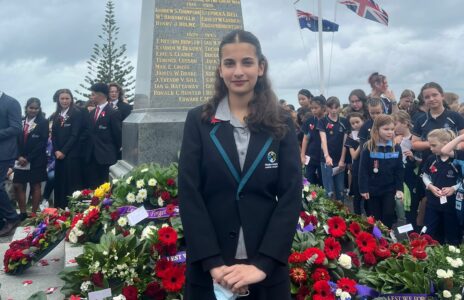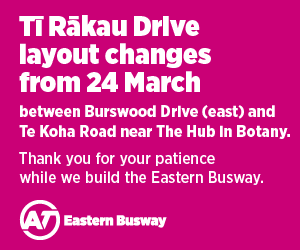
An eloquent east Auckland school pupil is among the people who played an important role at this year’s local Anzac Day commemorations.
Year 10 Mission Heights Junior College pupil Norah Mukalef delivered a speech during the civic service held on Stockade Hill in Howick on April 25.
She was given the honour by winning an Anzac speech competition, with her essay selected in its secondary division.
Three of the school’s pupils, Mohammad Dhalli, Abel Wee, and Faazil Muhammed, delivered their winning poems at the Auckland War Memorial Museum on Anzac Day.
Norah’s speech said April 25 is arguably one of the “most significant days on Aotearoa’s calendar, marking the anniversary of the battle on the Gallipoli Peninsula fought by ANZAC troops”.
“The ANZAC’s position in World War 1 was an imperative contributor to New Zealand’s coming of age,” she said.
“The blood that was shed formed the country we call home today, and the recognition of this brutal fact is crucial in keeping the names of fallen soldiers in our remembrance.
“In the early hours of April 25, 1915, 1600 Australian and New Zealand troops gathered at what we now know as ANZAC Cove alongside the Allies.
“This was the beginning of the campaign to capture the Gallipoli Peninsula, which at that point was owned by the Ottoman Empire.
“The initial landing was a failure, a sorrowful mistake that would lead to great fatalities.
“Forces landed approximately a mile away from the previously identified beaches, putting an immediate strain on the plan.
“Troops were forced to travel up steep ground with a lack of knowledge for said terrain.
“Regrettably, they were faced with an attack by the Turkish troops, quickly eliminating 752 men.
“This failure doomed the plan from the start.
“While evacuation was considered on this first day, it was clearly futile.
“An order issued by Sir Ian Hamilton read, ‘You have got through the difficult business, now you dig, dig, dig, until you are safe’.
“And that is exactly what they did.
“The Battle of Gallipoli persisted for eight grueling months, taking the lives of 44,000 Allied men.
“In January, 1916, the campaign was abandoned, and surviving men were evacuated over two months.
“It was the first of the many battles that would follow.
“Retrospectively, the campaign had no significant impact on the course of the war that followed, and the Ottoman Empire remained in possession of the Gallipoli Peninsula.
“Despite this regretful result of unnecessary executions, the battle established Aotearoa as a nation, contributing to the foundation of our country today.
“Moreover, Gallipoli now serves as a reminder of New Zealand’s courage, and commitment to battle, and further signifying our position with the British.
“Considering this, despite the devastation of Gallipoli, ANZAC troops developed a position that would last until today, shaping our national identity and fostering a sense of unity across the nation, and worldwide.
“The concept of ANZAC spirit is the embodiment of courage and unity, and this is something that persists in New Zealand culture.
“The camaraderie and bravery between soldiers that took place on the battlefield is rooted in our history, transcending the outer shell of ‘war’.
“The ANZAC spirit is representative of courage towards the greater good, and this is something that we can now celebrate.
“The loss of life on those raw grounds of battle contributed towards this ingrained spirit – something so regretful that filled our country with hope.
“Whether it is in the early hours of April 25, or present in the connection and unity between our nation, the ANZAC spirit is a persistent positive outcome of the ANZAC troops involvement in the dark days of World War 1, helping to change the tragedy from one to mourn, to a commemoration of strength and hope.
“While the battles of World War 1 may be seemingly distant in our past, the significant irrevocable trauma on soldiers and their whanau still rings true.
“The remembrance of these heroes’ dedication and courage to our country is pivotal in the preservation of our history, and appreciation of Aotearoa today.
“WW1 is written in New Zealand’s history books, and we will continue to read them and share their stories.
“As the sun rises, we will remember.
“Remember the fallen soldiers who lie beneath poppy gardens, fertilized with their bravery.
“Today, tomorrow, and forever. Lest we forget.”









